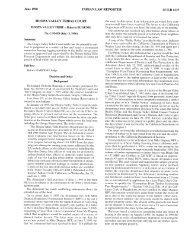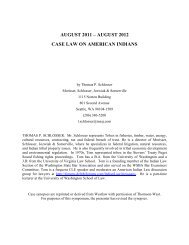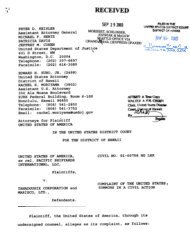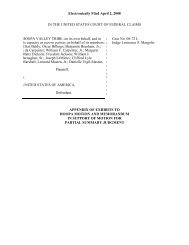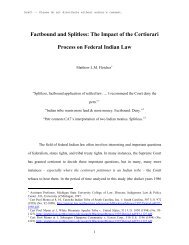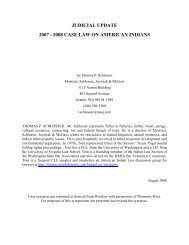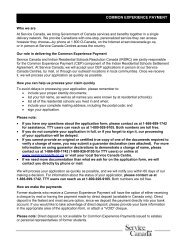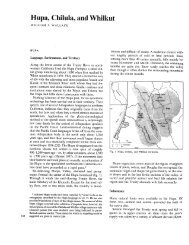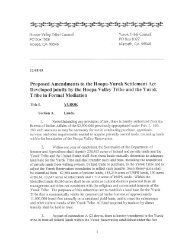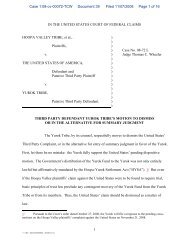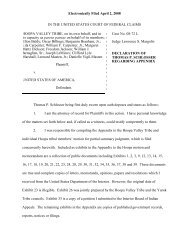18tribal land and has no right against the tribe to any specificpart of tribal property, absent a federal law or treatygranting vested rights to individual members. * * * Amember’s right to tribal property is no more than prospectiveand inchoate unless federal law or tribal law recognizesa more definite right. Citations omitted.Status of Hoopa Valley ReservationThe decisions of the United States Court of Claims in the case ofJessie Short et al. v. United States (Ct. C1. No. 102-63) and relatedcases, with respect to the interest of individual Indians in the revenuesfrom the Hoopa Valley Reservation, and the decision of theFederal district court in the case of Puzz v. United States, with respectto the obligation to manage the resources of that reservation,while perhaps correct on the peculiar facts and law, have had avery unhappy result.It is clear from the 1864 Act authorizing the establishment ofIndian reservations in California and the 18u76 and 1891 ExecutiveOrders creating the Hoopa Valley Reservation pursuant to suchAct that the reservation was created for tribal or communal Indianpurposes. This is consistent with the foregoing discussion and withthe law of the case in the Short case.Yet, the Court of Claims in the Short case very clearly has heldthat neither the organized Hoopa Valley Tribe, the unorganizedYurok Tribe, nor any other Indian tribe has any vested right to thebenefits or management of the Hoopa Valley Reservation. This,too, is consistent with the foregoing discussion. The 1876 ExecutiveOrder, creating the Hoopa Valley Reservation, merely providesthat it is “set apart for Indian purposes”. Since, as noted, reservationsare set aside for Indian tribes, since no tribes were designatedin the order, and since the court did not find that the Secretaryhad used his discretion to settle any Indian tribe on the reservation,it is clear that no tribal vested rights, as against the plenarypower of Congress to deal with the property, has arisen.The Conclusions of <strong>Law</strong> by the Federal district court in the Healingv. Jones case might be instructive. The 1882 Executive Ordercreating the reservation did designate the Hopi Tribe as a beneficiary,but retained with the Secretary the right “to settle other Indiansthereon”. In Conclusion of <strong>Law</strong> #2, the court stated:By force and effect of the Executive Order of December16,1882, * * * the Hopi Indian tribe, on December 16, 1882,for the common use and benefit of the Hopi Indians, acquiredthe non-vested (emphasis added) right to use andoccupy the entire reservation *: * * subject to the paramounttitle of the United States, and subject to such diminutionin the rights * * * SO acquired as might thereafterlawfully result from the exercise of the authority reservedin the Secretary to settle other Indians in the reservation.It is the Committee’s conclusion that, as found by the Sh~tcase,no constitutionally protected rights have vested in any Indian tribein and to the communal lands and other resources of the HoopaValley Reservation. In carrying out the trust responsibility of theUnited States under Congress’ plenary power, the Committee flnds
19that H.R. 4469, as reported, is a reasonable and equitable methodof resolving the confusion and uncertainty now existing on theHoopa Valley Reservation.While the court in the Short case has found that no tribe has avested right in the reservation, it was equally clear on the pointthat none of the plaintiffs nor any other individual has a vestedright in the property. Again, this holding of the court is consistentwith the discussion above on the rights of tribal members in tribalproperty. Two cities from the Federal courts’ several decisions inthis case may be helpful. In a 1983 decision of the Circuit Court inthis case, the court said:At the close of our opinion we again stress-what theCourt of Claims several times emphasized and we haveinterlaced supra-that all we are deciding are the standardsto be applied in determining those plaintiffs whoshould share as individuals in the monies from the * * *Reservation unlawfuly withheld by the United States.* * * This is solely a suit against the United States formonies, and everything we decide is in that connectionalone; neither the Claims Court nor this court is issuing ageneral declaratory judgment. We are not deciding standardsfor membership in any tribe, band, or Indian group,nor are we ruling that Hoopa membership standardsshould or must control membership in a Yurok tribe orany other entity that may be organized on the Reservation.In its March 17, 1987, decision, the court said+ * * an individual Indian’s rights in tribal or unallottedproperty arise only upon individualization; individual Indiansdo not hold vested severable interests in unallottedtribal lands and monies as tenants in common.Again, the Committee agrees with the court in the Short case thatneither the plaintiffs nor any other individuals have a vested rightin the Hoopa Valley Reservation as against the right of Congress tomake further disposition of that property. As noted above, Congresshas power to make determinations above tribal membershipwith resepct to the adjustment of participation in tribal property.The power is even more clear in this case, where except for theHoopa Valley Tribe, there is no organized tribe which has a definablemembership.Settlement ProvisionsH.R. 4469, as reported by the Committee, is a fair and equitablesettlement of the dispute relating to the ownership and managementof the Hoopa Valley Reservation. The Section-by-SectionAnalysis and Explanation which follows sets out in detail the provisionsof the bill.The bill provides for the partition of the joint reservation betweenthe Hoopa Valley Tribe and the Yurok Tribe. As noted, theCommittee has concluded that there are no tribal or individualvested rights in the reservation and that Congress has full power todispose of the reservation as proposed. As a consequence, the Com-



